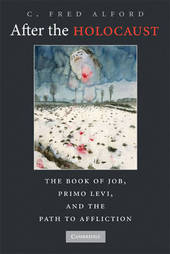
|
After the Holocaust: The Book of Job, Primo Levi, and the Path to Affliction
Paperback / softback
Main Details
| Title |
After the Holocaust: The Book of Job, Primo Levi, and the Path to Affliction
|
| Authors and Contributors |
By (author) C. Fred Alford
|
| Physical Properties |
| Format:Paperback / softback | | Pages:184 | | Dimensions(mm): Height 228,Width 152 |
|
| Category/Genre | Ethics and moral philosophy |
|---|
| ISBN/Barcode |
9780521747066
|
| Classifications | Dewey:128.4 |
|---|
| Audience | | Professional & Vocational | |
|---|
| Illustrations |
Worked examples or Exercises
|
|
Publishing Details |
| Publisher |
Cambridge University Press
|
| Imprint |
Cambridge University Press
|
| Publication Date |
27 April 2009 |
| Publication Country |
United Kingdom
|
Description
The Holocaust marks a decisive moment in modern suffering in which it becomes almost impossible to find meaning or redemption in the experience. In this study, C. Fred Alford offers a new and thoughtful examination of the experience of suffering. Moving from the Book of Job, an account of meaningful suffering in a God-drenched world, to the work of Primo Levi, who attempted to find meaning in the Holocaust through absolute clarity of insight, he concludes that neither strategy works well in today's world. More effective are the day-to-day coping practices of some survivors. Drawing on testimonies of survivors from the Fortunoff Video Archives, Alford also applies the work of Julia Kristeva and the psychoanalyst Donald Winnicot to his examination of a topic that has been and continues to be central to human experience.
Author Biography
C. Fred Alford is Professor of Government and Distinguished Scholar-Teacher at the University of Maryland, College Park. A recipient of three awards from the Fulbright Commission, he is the author of more than a dozen books in moral psychology, most recently, Psychology and the Natural Law of Reparation.
Reviews'Alford shows how carefully attending to our post-Holocaust predicament enables us to appreciate and share our humanity in ways that resist perverse forces intent on degrading and destroying human existence. Recognizing our finitude and fallibility while holding humankind accountable, Alford's flashes of insight are scarcely comforting, but they provide much-needed guidance that can bring us to our senses.' John K. Roth, Claremont McKenna College 'A work of literary sensitivity and erudition, After the Holocaust deepens our understanding not only of Holocaust survivors but of all who have been confronted by the unthinkable.' Raymond Scheindlin, Jewish Theological Seminary and translator of a new edition of the Book of Job
|